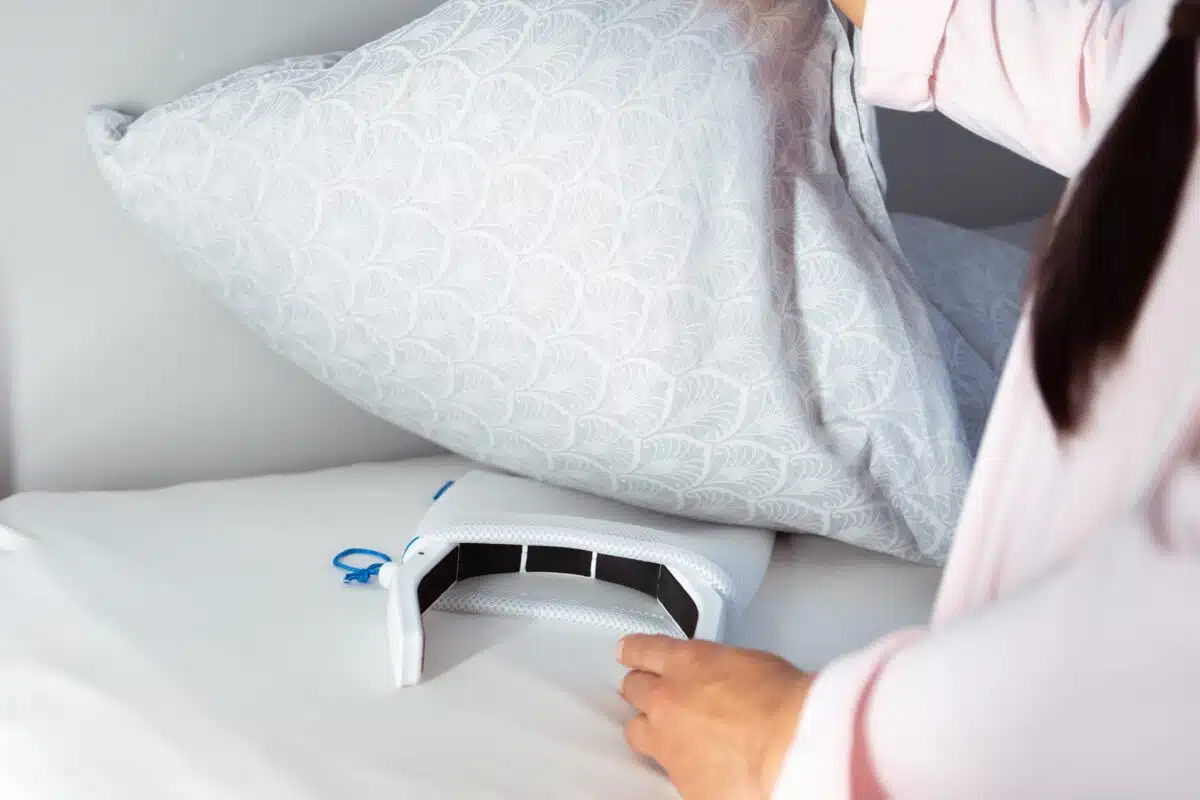
Understanding Fear: Insights into Brain Waves, Nightmares, Phobias and PEMF Theraphy
Fear is a fundamental emotion that serves as a protective mechanism, but when it becomes excessive, it can…

When you go to bed, you experience several stages of sleep consciousness before you reach your deepest, unconscious sleep. These stages are also responsible for why you can never remember the moment of actually falling asleep. As you are laying in bed, you begin to drift from your awake state into the first stage of sleep. At this point, you are shifting your brainwaves from Beta to Alpha and Theta. The first stage of sleep is shallow and you are easily woken up. You may experience muscle twitches or have strange thoughts and images popping into your mind as you transition from wandering thoughts into sleep.
After a while, you enter the second stage of sleep. Your body’s temperature drops – this explains why you often feel cold when falling asleep. Your brainwaves lower in frequency, and your heart rate and breathing slow down.
And then it comes. The deep sleep. During this time your brain and body repair themselves after everything you’ve brought onto them during the day. Your breathing, heartbeat, and body temperature are the lowest, and your brainwaves are in a Delta state. You are not easily awoken at this stage.
There is also one other stage: the rapid eye movement sleep, called REM. This is when dreams occur. The mind revives the fresh memories from the day before and mixes them with old memories, yielding bizarre visions in your dreams that you all know so well.
Table of Contents
Apart from the symptoms visible at first glance, something changes in your brain that lowers as you sink into sleep: your brainwaves. They are the synchronized firings of your neurons working in unison. As a rule of thumb, the more active your brain is, the faster the brainwaves. When you are alert and focused, populations of neurons fire quickly and the dominant bandwidth in your brain is Gamma brainwaves, oscillating between 35 to 100 times per second. When you close your eyes and start relaxing, you get into a state of Alpha, when your neurons fire between 8 to 12 times per second.
When you fall asleep, your brain activity slows down, until it reaches the lowest: delta frequency of 1 to 4 beats per second. That’s why deep sleep is also called slow-wave sleep or delta sleep. The slowest brainwaves which occur at that time reflect the low neural activity.
The process of deep sleep is crucial for your body to recharge its batteries. After the entire day’s work that you’ve put it through, slow-wave sleep is when your organism can recuperate. Blood sugar levels and metabolism get balanced out and the immune system gets an energizing kick. Your body also deals with what you’ve eaten and drunk. Toxins are flushed out, and all the useful stuff gets synthesized into the proteins of living tissue. This goes for muscles too: during Delta sleep, the growth hormone is secreted, which led scientists to believe that one of the functions of deep sleep is repairing and growing muscle tissue. Putting it briefly, slow-wave sleep is the time of recovery.
Just as your body can’t do without deep sleep, the same goes for your brain. This is when you experience a subconscious process of learning and remembering. During deep sleep, all the important events and pieces of knowledge that you have picked up throughout the day get consolidated in your memory. If you’ve learned something and you want to make it stick, you need deep sleep to do so. That’s why it’s not a good idea to cut on sleep when you’re cramming for exams.
During deep sleep, we also process our emotions. We all know the feeling when the problems, which seemed so grave in the evening, feel much less dramatic in the morning. “Sleeping it over” is often the best cure. The kind of emotional processing that happens when we are asleep is one of the most natural, therapeutic mechanisms. People who are depressed often suffer from insomnia – which may be both the cause as well as the symptom-aggravating outcome.

By now, you might be convinced that the importance of sleep cannot be overstated. A healthy dose of sleep for an adult is 8-9 hours. However, it’s not only important how much sleep you get, but also how much of it is the slow-wave, deep sleep.
If you want to stay healthy, deep sleep should consist of around 20% of your overall sleeping time. It means that for a full rejuvenation, you’ll need around 1,6 to 1,8 hours of slow-wave sleep. Of course, these proportions are different for children and adolescents, who need more sleep than adults.
Research has shown that low amounts of slow-wave sleep are correlated with higher BMI and waist circumference. Not getting enough sleep can increase the concentration of stress hormones and the likelihood of hypertension. It is also associated with a higher risk of diabetes. In some experiments, slow-wave sleep was suppressed in participants, causing their insulin sensitivity to drop. It took only three nights of not getting enough deep sleep to hamper their bodies’ ability to adequately respond to a glucose test.
Sounds daunting, right? When are you at risk of not getting enough deep sleep?
The first scenario is quite clear. When you don’t get enough sleep time, the amount of your slow-wave sleep shrinks as well. If you are in that vast group of people who sleep less to work more, you need to rethink whether what you’re doing is beneficial. Science says it’s not.
The second scenario is trickier. Some people sleep enough hours every day. They want to stay healthy and at the peak of their mental performance. Or they may love to sleep and are too stubborn to let the challenges of life dwindle their desired rest. They get 7-9 hours of sleep regularly. And they still wake up tired.
What’s the problem?
You see, the amount of deep sleep you get is more important than the total period spent asleep. You may be sleeping for a long time, but if slow-wave sleep is only 10% of that time, you won’t get properly rested.
What are the causes?
If your sleep is shallow and you twist and turn all night, you might not be getting enough deep sleep. There may be something about your lifestyle that disrupts your natural sleep cycle. Drinking coffee or alcohol late during the day or exposing yourself to the blue light from your computer or smartphone before going to bed can irregulate your circadian rhythm. Even though you get enough time to rest, your body is not able to transition into slow-wave sleep.
Other possible reasons include causes which you may need to consult with your doctor. A common sleep-disrupting ailment is sleep apnea. The symptoms may be snoring or frequently gasping for air throughout the night. The momentary suspensions of breathing prevent your body from getting enough oxygen, resulting in shallow and interrupted sleep.

How to tell when you’re not getting enough deep sleep?
Your body will send signals, craving for more Delta time. Insufficient slow-wave sleep can cause a “sleep drive”; throughout the day, you may feel sleepy and fatigued. Your organism will entice you to take a nap, during which your brain will try to get as much deep sleep as possible. Before you ask: no, taking naps won’t solve the problem of deep sleep shortage.
If you want to improve your deep sleep, one of the best ways to do so is to take care of your bedtime routine. Try to make your sleep regular, going to bed at a similar time every night. Most importantly, avoid blue light! Blue light is emitted from the screen of your laptop or phone. Research has shown that it disrupts the secretion of the sleep hormone melatonin. The reason is pretty straightforward: our organisms evolved following the cycle of day and night. When it gets darker, your brain receives it as time for rest. Exposing your eyes to blue light sends the wrong message, confusing the sleep-regulating systems in your brain.
Meditation may help calm down your mind after a stressful day, making it easier to fall asleep. Another solution to help you reach consistent deep sleep includes a PEMF device, which can help to entrain the slow-wave Delta rhythm in our brainwaves.

NeoRhythm has not been evaluated by the FDA. These products do not claim to diagnose, treat, cure, or prevent any medical conditions. Always consult your medical doctor regarding any health concerns.